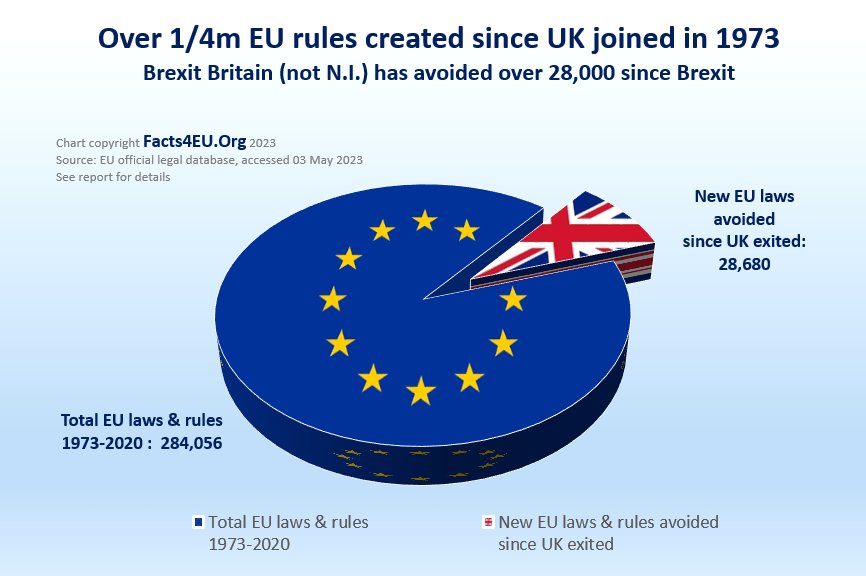EU Laws Part Three : Why we don’t believe the Civil Service
Over 280,000 rules in the EU’s database and the Civil Service can only identify 3,745?
In this third part in our series on EU retained laws (REUL) we question the official version
In EU-speak there is something called ‘the Acquis’, a French word describing the entire body of EU laws, directives, regulations, rules and decisions which all member countries are required to incorporate into their own legal frameworks.
For the 47 years of the United Kingdom’s membership of the European Union, the UK was one of the most scrupulous countries in doing this. The MPs in the UK Parliament had no say in any of this imposition of the EU’s rulebook.
Still ruled by EU laws – summary
Part One : What is “Retained EU law” and why does it matter to us all?
Part Two : Just how many EU laws do we still have and what are they?
Part Three : We don’t believe the official figures are accurate or meaningful – and here’s why (This report)
Part Four : The Government’s Remainer retreat and what MPs think of this
Over 30 new legal obligations every working day
The EU creates over 30 new packages of legal obligations every working day. Not one of these can be voted on by the parliaments of any EU member country.
If you’re a member country, you must simply accept this. And if you’re a member of the public, you can’t vote out the body that makes all these laws, directives and regulations at the next general election. There is no election and there is no choice. You must simply obey.
A random example from the EU’s legal database
Readers will no doubt be relieved to learn that the variety rights of asparagus, flower bulbs, woody small fruits and woody ornamentals are being protected by the EU.
Are you eating the wrong-shaped asparagus?
Regulation (EU) 2021/1873 of the European Parliament and of The Council, 20 October 2021

“On the extension of the term of the Community plant variety rights for varieties of the species Asparagus officinalis L. and of the species groups flower bulbs, woody small fruits and woody ornamentals.”
This Regulation is in force and applies to the following countries : BG, ES, CS, DA, DE, ET, EL, EN, FR, GA, HR, IT, LV, LT, HU, MT, NL, PL, PT, RO, SK, SL, FI, SV.
[Source : EU-Lex – The EU’s official legal database, accessed Sun 05 Feb 2023.]
Why we don’t believe the Civil Service
In today’s report we show the extent of ‘the Acquis’ and contrast its vastness with the small number of ‘Retained EU Laws’ the Civil Service has so far identified for possible appeal or amendment.
In February of this year we analysed the EU’s legal database – not a job for the faint-hearted. Below we present our analysis, before posing some difficult questions.
More than 280,000 legal obligations in the EU’s database during the UK’s membership
Summary
The EU’s legal minefield – a simple map through it
In the years since the UK joined the EEC (01 Jan 1973) until the year we technically exited (31 Jan 2020) there has been a LOT of EU legal interference in our lives.
- Total EU laws, treaties, judgements, directives, regulations, and decisions : 284,056
- NEW EU laws, judgements, directives, regulations, and decisions after exit: 28,680
- Average No. of NEW packages of legal instruments per working day : 32.8 / day
- All member countries must obey
[Source : EU-Lex – The EU’s official legal database, accessed Wed 03 May 2023.]
© Brexit Facts4EU.Org 2023 – click to enlarge
Note: We have excluded ‘corrections’ and ‘consolidated versions’.
The above contrasts with the Civil Service’s identification of just 3,745 EU laws
Each UK law can of course cover more than one of the legal requirements imposed by the EU during the UK’s membership. Nevertheless it is very hard to reconcile the figure of the EU’s 284,056 laws, treaties, judgements, directives, regulations and decisions with the Civil Service’s very modest number of laws affecting the United Kingdom.
NEW: Progress update on our BREXIT Documentary
– the positive case for the UK
Fighting back for a free, traditional & independent United Kingdom and how can you make a difference – don’t miss it!
Observations
The EU has penetrated the UK’s legal system for 47 years
Regardless of the comparatively small number (3,745) of ‘Retained EU laws’ which the Civil Service has so far identified after almost seven years since the British people’s vote to leave, the simple fact is that the EU’s rules have permeated the British legal system on a far wider scale.
We do not underestimate the task of unravelling all of this. What we do question is the apparent insouciance of the Civil Service in undertaking this task – almost as if they do not wish the United Kingdom to diverge too far from the EU’s ‘Acquis’ in the expectation that we will soon rejoin under a new government.
The Government must prioritise
During all the time of the UK’s membership of the EU, the UK’s priorities were of little interest to the EU Commission. Our strength in financial services, for example, was of less importance than protecting the interests of French, Spanish and Italian farmers.
When the EU did act in the area of financial and other services, it most certainly did not do so in the UK’s interests. Nor did it encourage the innovation which the UK is renowned for, the world over. Instead, the EU’s famous ‘precautionary principle’ applied. In other words, ban something until you can prove it is valuable. This is not the recipe for an environment in which a vibrant, forward-looking, entrepreneurial economy can grow and flourish.
After a bomb has been put under the Civil Service, it is then vital that the UK’s legal framework rids itself of all the statist, protectionist, anti-entrepreneurial measures which are holding back our success in the financial, genetics, AI, fintech, and other sectors. These will bring far greater prosperity than changes in DEFRA regulations.
Ministers will have to direct their departments to focus on priority areas which generate wealth. Oh, and fire anyone who still thinks they can ‘work from home’.
CIBUK thanks its Affiliated Organisation, Brexit Facts4EU.Org for their research and permission to republish this article.
The Brexit Facts4EU.Org article can be found here.
Main image : montage © Facts4EU.Org 2023

